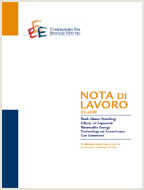Intellectual Property Rights, Product Complexity, and the Organization of Multinational Firms

06.09.2011
Alireza Naghavi, Julia Spies, Farid Toubal
F12, F23, O34
Sourcing Decision, Product Complexity, Intellectual Property Rights, Fractional Logit Estimation
Economy and Society
Giuseppe Sammarco
In this paper, we propose the technological complexity of a product and the level of Intellectual Property Rights (IPRs) protection to be the co-determinants of the mode through which multinational firms purchase their goods. We study the choice between intra-firm trade and outsourcing given heterogeneity at the product- (complexity), firm- (productivity) and country- (IPRs) level. Our findings suggest that the above three dimensions of heterogeneity are crucial for complex goods, where firms face a trade-off between higher marginal costs in the case of trade with an affiliate and higher imitation risks in the case of sourcing from an independent supplier. We test these predictions by combining data from a French firm-level survey on the mode choice for each transaction with a newly developed complexity measure at the product-level. Our fractional logit estimations confirm the proposition that although firms are generally reluctant to source highly complex goods from outside the firm’s boundaries, they do so when a strong IPR regime in the host country guarantees the protection of their technology.
